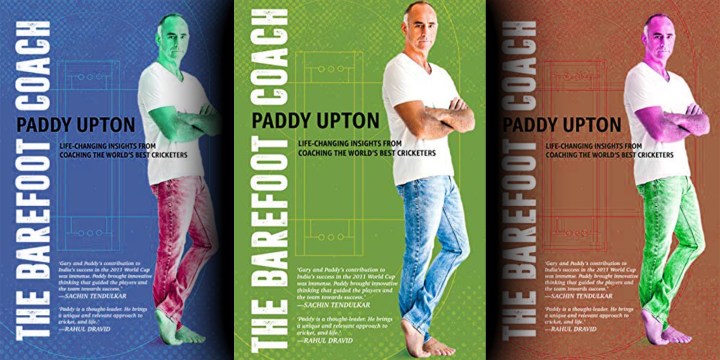BOOK REVIEW
‘Barefoot Coach’ questions definition of ‘success’

‘What is the definition of success?’ It seems an odd question from a man whose job it was to coach international cricket teams, but Paddy Upton is not your average sports coach. In fact, he’s not strictly a sports coach at all. He’s more of a one-man facilitator helping people become better human beings.
Paddy Upton, who was an assistant coach to Gary Kirsten when India won the 2011 Cricket World Cup, among his many exceptional coaching credentials, has written an entertaining memoir titled: “The Barefoot Coach – Life-changing lessons from coaching the world’s best cricketers”.
Sports teams and businesses generally term success as winning. In sports, it’s titles and trophies that appear to define success and in business, success is usually measured by profits and share prices. Upton is not restricted by such narrow definitions, which is a point he constantly drives home throughout this engaging read.
Success is made up of myriad components and while he never loses sight, in cricketing terms at least, that winning a title is vital, he stresses that success can only be achieved by winning many smaller skirmishes along the way. Upton’s approach is a master-class in working through a process to reach an outcome – success – by first deconstructing its narrow definition and then constructing a pathway to reach the goal. But “success” is not a destination, rather a journey.
Upton does this by constantly questioning and evaluating himself and continually challenging his own weaknesses and needs (his ego) by putting a team first. He shows vulnerability through his doubts that he is a worthy coach because his cricket-playing credentials are mediocre, yet he reveals strength in the realisation that he has to let go of ego to serve others.
Success, ultimately, is not one thing, but a combination of improvements that might lead to some sort of prize in a defined period.
In life, success in its most traditional sense is short-lived. When India won the World Cup in 2011 that was seen as a success. But within days after winning, the next World Cup cycle came into view and the next challenge was approaching. Success, as measured by titles, is momentary, but the search for it is continual.
While cricket is a central thread through the book, Upton’s role has always been about improving the individual as a person, which in turn would make them a better sportsman, teammate and most importantly, member of society. That’s the theory anyway, but as Upton admits, sometimes you just have to cut your losses in certain circumstances.
When he was asked to coach the Sydney Thunder, in Australia’s T20 Big Bash League, Upton shelved his natural instincts to help people become better versions of themselves when he dealt with then-Australia skipper Michael Clarke and star batsman David Warner. He axed both from the team. It was a decision that shook the Aussie cricket firmament.
Upton had observed that a team which had lost 21 of 22 matches over the previous few seasons didn’t have a playing problem: it had a culture issue. And heading the Thunder’s toxic culture were Clarke and Warner.
We know now how wretched Warner was, after the sandpaper-gate scandal that erupted in Cape Town in early 2018, three years after Upton saw the warning signs.
Warner was one of the main instigators in pressurising youngster Cameron Bancroft to scuff the ball with sandpaper to artificially alter its form, which would assist the bowlers. The action was caught on camera and Warner, captain Steve Smith and Bancroft were all suspended for a year. Australian cricket was plunged into turmoil and forced to admit it had a culture problem and to begin the process of facing its challenges and remedying them.
Upton admits that the leadership coach in him would have liked to work with Clarke and Warner, but in the tight timeframe he made the decision that culling them was in the team’s best interests.
“I’m often asked how do you manage the maverick, that superstar that behaves differently,” Upton said on the latest Maverick Sports Podcast.
“In that (Big Bash) T20 cricket tournament you have about five days before the first game and there isn’t really time to rehabilitate the way Michael Clarke and David Warner were behaving at the time. If we were given a year, two or three, I would have said ‘yes, let’s take them on board’. My message to management was that you don’t want those destructive individuals in your team for any length of time.
“If they are high performers, but a cancer, they might deliver results today, but they will sink the whole body tomorrow. We mustn’t use that as an excuse for our inability as leaders to manage difficult individuals, though.
“We first need to look at ourselves and ask if it’s a leadership shortcoming in me and therefore I label them as destructive.” In this instance, that clearly wasn’t the case.
And that is the main narrative of the book – becoming a better person through self-awareness and analysis to achieve a much broader version of success – balance.
Upton’s easy writing style and ability to use real-life examples from his sporting experiences, or his experiences as a self-styled youth social worker on Cape Town’s hard inner-city streets, make the potentially boring “life-coaching” lessons relatable and tangible.
There is all the jargon associated with leadership training such as a “personal mastery”, “continual learning”, “servant leadership” and “value systems”. But don’t let your eyes glaze over because in Upton’s capable hands these concepts have meaning as he uses examples throughout the course of the 357 pages to be both entertaining and inspiring.
The Barefoot Coach is a success, by any definition. DM
Listen to Paddy Upton on the Maverick Sports Podcast part 1 here, and part 2 here.


















 Become an Insider
Become an Insider